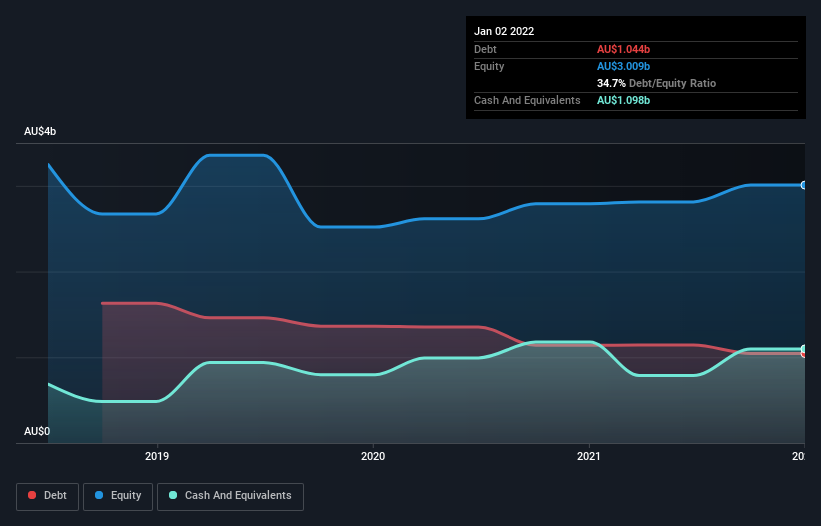- Australia
- /
- Food and Staples Retail
- /
- ASX:COL
These 4 Measures Indicate That Coles Group (ASX:COL) Is Using Debt Reasonably Well
Some say volatility, rather than debt, is the best way to think about risk as an investor, but Warren Buffett famously said that 'Volatility is far from synonymous with risk.' So it might be obvious that you need to consider debt, when you think about how risky any given stock is, because too much debt can sink a company. We note that Coles Group Limited (ASX:COL) does have debt on its balance sheet. But should shareholders be worried about its use of debt?
What Risk Does Debt Bring?
Generally speaking, debt only becomes a real problem when a company can't easily pay it off, either by raising capital or with its own cash flow. Part and parcel of capitalism is the process of 'creative destruction' where failed businesses are mercilessly liquidated by their bankers. However, a more common (but still painful) scenario is that it has to raise new equity capital at a low price, thus permanently diluting shareholders. Of course, the upside of debt is that it often represents cheap capital, especially when it replaces dilution in a company with the ability to reinvest at high rates of return. When we examine debt levels, we first consider both cash and debt levels, together.
See our latest analysis for Coles Group
What Is Coles Group's Net Debt?
The image below, which you can click on for greater detail, shows that Coles Group had debt of AU$1.04b at the end of January 2022, a reduction from AU$1.14b over a year. However, it does have AU$1.10b in cash offsetting this, leading to net cash of AU$54.0m.

How Healthy Is Coles Group's Balance Sheet?
The latest balance sheet data shows that Coles Group had liabilities of AU$6.35b due within a year, and liabilities of AU$9.24b falling due after that. Offsetting these obligations, it had cash of AU$1.10b as well as receivables valued at AU$336.0m due within 12 months. So it has liabilities totalling AU$14.1b more than its cash and near-term receivables, combined.
Coles Group has a very large market capitalization of AU$24.5b, so it could very likely raise cash to ameliorate its balance sheet, if the need arose. But we definitely want to keep our eyes open to indications that its debt is bringing too much risk. While it does have liabilities worth noting, Coles Group also has more cash than debt, so we're pretty confident it can manage its debt safely.
Importantly Coles Group's EBIT was essentially flat over the last twelve months. Ideally it can diminish its debt load by kick-starting earnings growth. The balance sheet is clearly the area to focus on when you are analysing debt. But it is future earnings, more than anything, that will determine Coles Group's ability to maintain a healthy balance sheet going forward. So if you want to see what the professionals think, you might find this free report on analyst profit forecasts to be interesting.
Finally, while the tax-man may adore accounting profits, lenders only accept cold hard cash. While Coles Group has net cash on its balance sheet, it's still worth taking a look at its ability to convert earnings before interest and tax (EBIT) to free cash flow, to help us understand how quickly it is building (or eroding) that cash balance. During the last three years, Coles Group generated free cash flow amounting to a very robust 93% of its EBIT, more than we'd expect. That puts it in a very strong position to pay down debt.
Summing up
Although Coles Group's balance sheet isn't particularly strong, due to the total liabilities, it is clearly positive to see that it has net cash of AU$54.0m. And it impressed us with free cash flow of AU$1.6b, being 93% of its EBIT. So we are not troubled with Coles Group's debt use. When analysing debt levels, the balance sheet is the obvious place to start. But ultimately, every company can contain risks that exist outside of the balance sheet. Be aware that Coles Group is showing 1 warning sign in our investment analysis , you should know about...
If you're interested in investing in businesses that can grow profits without the burden of debt, then check out this free list of growing businesses that have net cash on the balance sheet.
New: AI Stock Screener & Alerts
Our new AI Stock Screener scans the market every day to uncover opportunities.
• Dividend Powerhouses (3%+ Yield)
• Undervalued Small Caps with Insider Buying
• High growth Tech and AI Companies
Or build your own from over 50 metrics.
Have feedback on this article? Concerned about the content? Get in touch with us directly. Alternatively, email editorial-team (at) simplywallst.com.
This article by Simply Wall St is general in nature. We provide commentary based on historical data and analyst forecasts only using an unbiased methodology and our articles are not intended to be financial advice. It does not constitute a recommendation to buy or sell any stock, and does not take account of your objectives, or your financial situation. We aim to bring you long-term focused analysis driven by fundamental data. Note that our analysis may not factor in the latest price-sensitive company announcements or qualitative material. Simply Wall St has no position in any stocks mentioned.
About ASX:COL
Acceptable track record with mediocre balance sheet.
Similar Companies
Market Insights
Community Narratives



